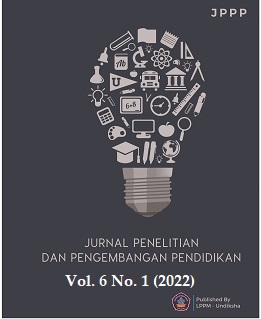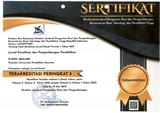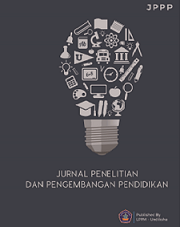Bahan Ajar Interaktif Berbasis Pendekatan STEAM pada Muatan IPS Siswa Kelas V SD
DOI:
https://doi.org/10.23887/jppp.v6i1.45370Keywords:
Bahan ajar interaktif, STEAM, IPSAbstract
Kurangnya sumber belajar yang dimiliki siswa tentunya berakibat pada kurangnya pemahaman siswa mengenai materi pembelajaan yang telah dibahas. Selain itu, kurangnya variasi dalam proses pembelajaran membuat siswa menjadi cepat bosan dan kurang fokus dalam pembelajaran. Penelitian ini bertujuan untuk mengembangkan media bahan ajar interaktif berbasis pendekatan STEAM pada muatan IPS siswa kelas V SD. Jenis penelitian ini yaitu pengembangan. Penelitian ini menggunakan model pengembangan ADDIE. Metode yang digunakan dalam mengumpulkan data yaitu observasi, wawancara dan kuesioner. Instrument yang digunakan dalam mengumpulkan data yaitu kuesioner. Subjek dalam penelitian ini melibatkan 25 orang siswa kelas V SD. Teknik analisis data yang digunakan adalah teknik analisis deskriptif meliputi analisis deskriptif kuantitatif, analisis deskriptif kualitatif dan uji t sample dependent. Hasil penelitian yaitu penilaian ahli isi mata pelajaran diperoleh hasil dengan persentase sangat baik, hasil ahli desain pembelajaran kategori baik, hasil ahli media pelajaran kategori sangat baik, uji coba perorangan kategori sangat baik, uji coba kelompok kecil yaitu kategori baik dan untuk uji lapangan yaitu kategori baik. Berdasarkan hasil analisis statistik infrensial (uji t) diperoleh hasil H0 ditolak dan H1 diterima. Jadi, dapat disimpulkan bahwa media bahan ajar interaktif terbukti efektif secara signifikan dapat meningkatkan hasil belajar pembelajaran tematik mata pelajaran IPS pada siswa kelas V di SD.
References
Aguilera, D., & Ortiz-Revilla, J. (2021). Stem vs. Steam education and student creativity: A systematic literature review. Education Sciences, 11(7). https://doi.org/10.3390/educsci11070331. DOI: https://doi.org/10.3390/educsci11070331
Agung, A. agung gede. (2018). Metodelogi Penelitian Kuantitatif. Universitas Pendidikan Ganesha.
Ahmad, D. N., Astriani, M. M., Alfahnum, M., & Setyowati, L. (2021). Increasing creative thinking of students by learning organization with steam education. Jurnal Pendidikan IPA Indonesia, 10(1), 103–110. https://doi.org/10.15294/jpii.v10i1.27146. DOI: https://doi.org/10.15294/jpii.v10i1.27146
Alias, N., & Siraj, S. (2012). Effectiveness of Isman Instructional Design Model in Developing Physics Module based on Learning Style and Appropriate Technology. Procedia - Social and Behavioral Sciences, 64. https://doi.org/10.1016/j.sbspro.2012.11.002. DOI: https://doi.org/10.1016/j.sbspro.2012.11.002
Andarwulan, T., Al Fajri, T. A., & Damayanti, G. (2021). Elementary teachers’ readiness toward the online learning policy in the new normal era during Covid-19. International Journal of Instruction, 14(3), 771–786. https://doi.org/10.29333/iji.2021.14345a. DOI: https://doi.org/10.29333/iji.2021.14345a
Anisah, & Lastuti, S. (2018). Pengembangan Bahan Ajar berbasis HOTS untuk Meningkatkan Kemampuan Pemecahan Masalah Matematis Mahasiswa. Kreano: Jurnal Matematika Kreatif-Inovatif, 9(2), 191–197. https://doi.org/10.15294/kreano.v9i2.16341.
Ardianti, S. D., Wanabuliandari, S., Saptono, S., & Alimah, S. (2019). A needs assessment of edutainment module with ethnoscience approach oriented to the love of the country. Jurnal Pendidikan IPA Indonesia, 8(2), 153–161. https://doi.org/10.15294/jpii.v8i2.13285. DOI: https://doi.org/10.15294/jpii.v8i2.13285
Arisantiani, N. K., Putra, M., & Ganing, N. N. (2017). Pengaruh Model Pembelajaran Children’s Learning in Science berbantuan Media Audio Visual terhadap Kompetensi Pengetahuan IPA. Journal of Education Technology, 1(2), 124–132. https://doi.org/10.23887/jisd.v2i3.16150. DOI: https://doi.org/10.23887/jet.v1i2.11774
Bahrum, Wahid, & Ibrahim. (2018). Integration of STEM Education in Malaysia and Why to STEAM. International Journal of Academic Research in Business and Social Sciences, 7(6), 645–654. https://doi.org/10.6007/ijarbss/v7-i6/3027. DOI: https://doi.org/10.6007/IJARBSS/v7-i6/3027
Baka, T. ., Laksana, D. N. ., & Dhiu, K. . (2018). Konten dan Konteks Budaya Lokal Ngada sebagai Bahan Ajar Tematik di Sekolah Dasar. Journal of Education Technology, 2(2), 46–55. https://doi.org/10.23887/jet.v2i2.16181. DOI: https://doi.org/10.23887/jet.v2i2.16181
Benjamin, T. E., Marks, B., Demetrikopoulos, M. K., Rose, J., Pollard, E., Thomas, A., & Muldrow, L. L. (2017). Development and Validation of Scientific Literacy Scale for College Preparedness in STEM with Freshmen from Diverse Institutions. International Journal of Science and Mathematics Education, 15(4), 607–623. https://doi.org/10.1007/s10763-015-9710-x. DOI: https://doi.org/10.1007/s10763-015-9710-x
Degeng, S., I. N., S., Rinanityas, E. P., Prihatin, Priawasana, Mais, A., & Usman, U. (2021). The Effect of PBL-based STEAM Approach on The Cognitive and Affective Learning Outcomesof Primary School. Turkish Journal of Computer and Mathematics Education (TURCOMAT), 12(6). https://doi.org/10.17762/turcomat.v12i6.5521. DOI: https://doi.org/10.17762/turcomat.v12i6.5521
Dietrich, N., Kentheswaran, K., Ahmadi, A., Teychene, J., Bessiere, Y., Alfenore, S., Laborie, S., Bastoul, D., Loubiere, K., Guigui, C., Sperandio, M., Barna, L., Paul, E., Cabassud, C., Line, A., & Hebrard, G. (2020). Attempts, successes, and failures of distance learning in the time of covid-19. Journal of Chemical Education, 97(9), 2448–2457. https://doi.org/10.1021/acs.jchemed.0c00717. DOI: https://doi.org/10.1021/acs.jchemed.0c00717
Dike, D., Parida, L., & Stevanus, I. (2020). Micro Strategy And Character Educational Transformation In Elementary School During The Covid-19 Pandemic of Sintang Distric, West Kalimantan Province. European Journal of Molecular and Clinical Medicine, 7(8), 775–786.
Dong, C., Cao, S., & Li, H. (2020). Young children’s online learning during COVID-19 pandemic: Chinese parents’ beliefs and attitudes. Children and Youth Services Review, 118(June), 105440. https://doi.org/10.1016/j.childyouth.2020.105440. DOI: https://doi.org/10.1016/j.childyouth.2020.105440
Dupri, D., Candra, O., Candra, A., & Suryani, D. A. (2020). The Implementation of Problem Based Learning Model in Improving Cooperation and Learning Outcomes in Physical Education. Jurnal Pendidikan Jasmani Dan Olahraga, 5(1). https://doi.org/10.17509/jpjo.v5i1.22531. DOI: https://doi.org/10.17509/jpjo.v5i1.22531
Fadli, M. R., Sudrajat, A., Zulkarnain, A., Setiawan, R., & Amboro, K. (2020). The Effectiveness of E-Module Learning History Inquiry Model to Grow Student Historical Thinking Skills Material Event Proclamation of Independence. Decision Making, 6(7).
Fernández, C., Llinares, S., & Rojas, Y. (2020). Prospective mathematics teachers’ development of noticing in an online teacher education program. ZDM - Mathematics Education, 52(5), 959–972. https://doi.org/10.1007/s11858-020-01149-7. DOI: https://doi.org/10.1007/s11858-020-01149-7
Glassman, M., Kuznetcova, I., Peri, J., & Kim, Y. (2021). Cohesion, collaboration and the struggle of creating online learning communities: Development and validation of an online collective efficacy scale. Computers and Education Open, 2(January), 100031. https://doi.org/10.1016/j.caeo.2021.100031. DOI: https://doi.org/10.1016/j.caeo.2021.100031
Goudeau, S., Sanrey, C., Stanczak, A., Manstead, A., & Darnon, C. (2021). Why lockdown and distance learning during the COVID-19 pandemic are likely to increase the social class achievement gap. Nature Human Behaviour. https://doi.org/10.1038/s41562-021-01212-7. DOI: https://doi.org/10.1038/s41562-021-01212-7
Gustiawati, R., Arief, D., & Zikri, A. (2020). Pengembangan Bahan Ajar Membaca Permulaan dengan Menggunakan Cerita Fabel pada Siswa Sekolah Dasar. Jurnal Basicedu, 4(2), 355–360. https://doi.org/10.31004/basicedu.v4i2.339. DOI: https://doi.org/10.31004/basicedu.v4i2.339
Hadiyanti, N. F. D., Hobri, Prihandoko, A. C., Susanto, Murtikusuma, R. P., Khasanah, N., & Maharani, P. (2021). Development of mathematics e-module with STEM-collaborative project based learning to improve mathematical literacy ability of vocational high school students. Journal of Physics: Conference Series, 1839(1). https://doi.org/10.1088/1742-6596/1839/1/012031. DOI: https://doi.org/10.1088/1742-6596/1839/1/012031
Haifaturrahmah, H., Hidayatullah, R., Maryani, S., Nurmiwati, N., & Azizah, A. (2020). Pengembangan Lembar Kerja Siswa Berbasis STEAM untuk Siswa Sekolah Dasar. Jurnal Kependidikan: Jurnal Hasil Penelitian Dan Kajian Kepustakaan Di Bidang Pendidikan, Pengajaran Dan Pembelajaran, 6(2), 310. https://doi.org/10.33394/jk.v6i2.2604. DOI: https://doi.org/10.33394/jk.v6i2.2604
Harahap, S. A., Dimyati, D., & Purwanta, E. (2021). Problematika Pembelajaran Daring dan Luring Anak Usia Dini bagi Guru dan Orang tua di Masa Pandemi Covid 19. Jurnal Obsesi : Jurnal Pendidikan Anak Usia Dini, 5(2), 1825–1836. https://doi.org/10.31004/obsesi.v5i2.1013. DOI: https://doi.org/10.31004/obsesi.v5i2.1013
Irvani, A. I. (2019). Hubungan Kemampuan Self-Directed Learning Dan Problem Solving Siswa Smp Melalui Pembelajaran Berbasis Masalah. Journal of Teaching and Learning Physics, 4(1), 28–33. https://doi.org/10.15575/jotalp.v4i1.3792. DOI: https://doi.org/10.15575/jotalp.v4i1.3792
Istuningsih, W., Baedhowi, & Bayu Sangka, K. (2018). The Effectiveness of Scientific Approach Using E-Module Based on Learning Cycle 7E to Improve Students’ Learning Outcome. International Journal of Educational Research Review, 3(3), 75–85. https://doi.org/10.24331/ijere.449313. DOI: https://doi.org/10.24331/ijere.449313
Junedi, B., Mahuda, I., & Kusuma, J. W. (2020). Optimalisasi keterampilan pembelajaran abad 21 dalam proses pembelajaran pada Guru MTs Massaratul Mut’allimin Banten. Transformasi: Jurnal Pengabdian Masyarakat, 16(1), 63–72. https://doi.org/10.20414/transformasi.v16i1.1963. DOI: https://doi.org/10.20414/transformasi.v16i1.1963
Latifah, S., & Utami, A. (2019). Pengembangan Bahan Ajar Interaktif Berbasis Media Sosial Schoology. Indonesian Journal of Science and Mathematics Education, 2(1), 36–45. https://doi.org/10.24042/ijsme.v2i1.3924. DOI: https://doi.org/10.24042/ijsme.v2i1.3924
Lepiyanto, A., & Pratiwi, D. (2015). Pengembangan Bahan Ajar Berbasis Inkuiri Terintegrasi Nilai Karakter Peduli Lingkungan Pada Materi Ekosistem. BIOEDUKASI (Jurnal Pendidikan Biologi), 6(2), 143–147. https://doi.org/10.24127/bioedukasi.v6i2.344. DOI: https://doi.org/10.24127/bioedukasi.v6i2.344
Lestari, D. (2019). Pengaruh Model Pembelajaran Problem Based Learning terhadap Hasil Belajar Ipa Siswa Ditinjau dari Kemampuan Dasar Matematika. Belantika Pendidikan, 1(2), 44–55. https://doi.org/10.47213/bp.v1i2.21. DOI: https://doi.org/10.47213/bp.v1i2.21
Linda, R., Herdini, Sulistya, I., & Putra, T. P. (2018). Interactive E-Module Development through Chemistry Magazine on Kvisoft Flipbook Maker Application for Chemistry Learning in Second Semester at Second Grade Senior High School. Journal of Science Learning, 2(1), 21–25. https://doi.org/10.17509/jsl.v2i1.12933. DOI: https://doi.org/10.17509/jsl.v2i1.12933
Lisdayanti, N. P., Ardana, I. K., & Suryaabadi, I. B. G. (2014). Pengaruh Model Pembelajaran Kooperatif Talking Stick Berbantuan Media Gambar Terhadap Hasil Belajar IPA Siswa Kelas V Sd Gugus 4 Baturiti. Journal Mimbar PGSD Universitas Pendidikan Ganesha Jurusan PGSD, 2(1). https://doi.org/10.23887/jjpgsd.v2i1.1962.
Makhrus, M., Harjono, A., Syukur, A. B., & Muntari, S. (2018). Identifikasi kesiapan LKPD guru terhadap keterampilan abad 21 pada pembelajaran IPA SMP. Jurnal Ilmiah Profei Pendidikan, 3(2), 124–128. https://doi.org/10.29303/jipp.v3i2.20. DOI: https://doi.org/10.29303/jipp.v3i2.20
Mali, D., & Lim, H. (2021). How do students perceive face-to-face/blended learning as a result of the Covid-19 pandemic? International Journal of Management Education, 19(3), 100552. https://doi.org/10.1016/j.ijme.2021.100552. DOI: https://doi.org/10.1016/j.ijme.2021.100552
Maqableh, M., & Alia, M. (2021). Evaluation online learning of undergraduate students under lockdown amidst COVID-19 Pandemic: The online learning experience and students’ satisfaction. Children and Youth Services Review, 128(1). https://doi.org/10.1016/j.childyouth.2021.106160. DOI: https://doi.org/10.1016/j.childyouth.2021.106160
Marsiding, Z. (2021). Efektifitas Penggunaan Media Zoom Terhadap Pembelajaran Pada Masa Pandemi Covid-19. Jurnal Ilmiah Pranata Edu, 2(1), 33–39. https://doi.org/10.36090/jipe.v2i1.931. DOI: https://doi.org/10.36090/jipe.v2i1.931
Maslina, A. S. A. A. (2020). Pengembangan Bahan Ajar Ipa Dengan Media Audio Visual Pada Tema Selamatkan Makhluk Hidup Di Pendidikan Dasar. In Jurnal JPSD (Jurnal Pendidikan Sekolah Dasar) (Vol. 7, Issue 1). https://doi.org/10.12928/jpsd.v7i1.14467.
Matsun, Andrini, V. S., Maduretno, T. W., & Yusro, A. C. (2019). Development of physics learning e-module based on local culture wisdom in Pontianak,West Kalimantan. Journal of Physics: Conference Series, 1381(1). https://doi.org/10.1088/1742-6596/1381/1/012045. DOI: https://doi.org/10.1088/1742-6596/1381/1/012045
Mohr, S. C., & Shelton, K. (2017). Best Practices Framework for Online Faculty Professional Development: A Delphi Study. Online Learning Journal, 21(4). https://doi.org/10.24059/olj.v21i4.1273. DOI: https://doi.org/10.24059/olj.v21i4.1273
Mpungose, C. B. (2020). Emergent transition from face-to-face to online learning in a South African University in the context of the Coronavirus pandemic. Humanities and Social Sciences Communications, 7(1), 1–9. https://doi.org/10.1057/s41599-020-00603-x. DOI: https://doi.org/10.1057/s41599-020-00603-x
Ningsih, S. Y., & Mahyuddin, N. (2021). Desain E-Module Tematik Berbasis Kesantunan Berbahasa Anak Usia Dini di Taman Kanak-Kanak. Jurnal Obsesi : Jurnal Pendidikan Anak Usia Dini, 6(1), 137–149. https://doi.org/10.31004/obsesi.v6i1.1217. DOI: https://doi.org/10.31004/obsesi.v6i1.1217
Noer, R. Z., Wahid, S. M. Al, & Febriyanti, R. (2021). Online lectures : An implementation of full e-learning action research. Jurnal Prima Edukasia, 9(1), 65–74. https://doi.org/10.21831/jpe.v9i1.35030. DOI: https://doi.org/10.21831/jpe.v9i1.35030
Nurhasanah, A., & MS, Z. (2021). Penerapan Pembelajaran Inovatif STEAM di Sekolah Dasar. JIKAP PGSD: Jurnal Ilmiah Ilmu Kependidikan, 5(2), 204. https://doi.org/10.26858/jkp.v5i2.20309. DOI: https://doi.org/10.26858/jkp.v5i2.20309
Nurjanah, N. E. (2020). Pembelajaran Stem Berbasis Loose Parts Untuk Meningkatkan Kreativitas Anak Usia Dini. Jurnal Ilmiah Kajian Ilmu Anak Dan Media Informasi PAUD, V(1), 19–31. https://doi.org/10.33061/jai.v5i1.3672.
Oktaviani, A., Anom, K., & Lesmini, B. (2020). Pengembangan Modul Kimia terintegrasi STEM (Science, Technology, Engineering and Mathematics) dan PBL (Problem-Based Learning). Journal of Educational Chemistry (JEC), 2(2), 64. https://doi.org/10.21580/jec.2020.2.2.6279. DOI: https://doi.org/10.21580/jec.2020.2.2.6279
Pasani, C. F., & Amelia, R. (2021). Introduction of the integrative STEAM approach as a learning innovation in the COVID-19 pandemic in South Kalimantan. Journal of Physics: Conference Series, 1. https://doi.org/10.1088/1742-6596/1832/1/012029. DOI: https://doi.org/10.1088/1742-6596/1832/1/012029
Pramana, M. W. A., Jampel, I. N., & Pudjawan, K. (2020). Meningkatkan Hasil Belajar Biologi Melalui E-Modul Berbasis Problem Based Learning. Jurnal Edutech Undiksha, 8(2), 17. https://doi.org/10.23887/jeu.v8i2.28921. DOI: https://doi.org/10.23887/jeu.v8i2.28921
Prameswari, T., & Anik Lestariningrum. (2020). Strategi Pembelajaran Berbasis STEAM Dengan Bermain Loose Parts Untuk Pencapaian Keterampilan 4c Pada Anak Usia 4-5 Tahun. Efektor, 7(1), 24–34. https://doi.org/10.29407/e.v7i2.14387. DOI: https://doi.org/10.29407/e.v7i2.14387
Qomariyah, N., & Qalbi, Z. (2021). Pemahaman Guru PAUD Tentang Pembelajaran Berbasis STEAM dengan Penggunaan Media Loose Parts di Desa Bukit Harapan. JECED : Journal of Early Childhood Education and Development, 3(1), 47–52. https://doi.org/10.15642/jeced.v3i1.995. DOI: https://doi.org/10.15642/jeced.v3i1.995
Rahmatia, R., Pajarianto, H., Kadir, A., Ulpi, W., & Yusuf, M. (2021). Pengembangan Model Bermain Konstruktif dengan Media Balok untuk Meningkatkan Visual-Spasial Anak. Jurnal Obsesi : Jurnal Pendidikan Anak Usia Dini, 6(1). https://doi.org/10.31004/obsesi.v6i1.1185. DOI: https://doi.org/10.31004/obsesi.v6i1.1185
Rasmawan. (2018). Development of Chemistry Module for Junior High School Based on Inquiry Accompanied by Performance-Based Assessment. Jurnal Pendidikan Indonesia, 7(2), 111–119. https://doi.org/10.23887/jpi-undiksha.v7i2.10617.
Rasvani, N. L. A., & Wulandari, I. G. A. (2021). Pengembangan media pembelajaran aplikasi maca ( materi pecahan ) berorientasi teori belajar ausubel muatan matematika. Mimbar PGSD Undiksha, 9(1), 74–81. https://doi.org/10.23887/jjpgsd.v9i1.32032. DOI: https://doi.org/10.23887/jjpgsd.v9i1.32032
Reneman, M. F., Beemster, T. T., Welling, S. J., Mierau, J. O., & Dijk, H. H. (2021). Vocational Rehabilitation for Patients with Chronic Musculoskeletal Pain With or Without a Work Module: An Economic Evaluation. Journal of Occupational Rehabilitation, 31(1), 84–91. https://doi.org/10.1007/s10926-020-09921-y. DOI: https://doi.org/10.1007/s10926-020-09921-y
Rizki Umi Nurbaeti. (2019). Pengembangan Bahan Ajar Ipa Berbasis Problem Based Learning Untuk Siswa Kelas V Sekolah Dasar. Jurnal Cakrawala Pendas, 5(1), 53–75. https://doi.org/10.31949/jcp.v5i1.1233. DOI: https://doi.org/10.31949/jcp.v5i1.1233
Rokhim, D. A., Widarti, H. R., & Fajaroh, F. (2020). Pengembangan Bahan Belajar Flipbook pada Materi Redoks dan Elektrokimia Berbasis Pendekatan STEM-PjBL Berbantuan Video Pembelajaran. Kwangsan: Jurnal Teknologi Pendidikan, 8(2), 234–250. https://doi.org/10.31800/jtp.kw.v8n2.p234--250. DOI: https://doi.org/10.31800/jtp.kw.v8n2.p234--250
Safithri, R., Syaiful, S., & Huda, N. (2021). Pengaruh Penerapan Problem Based Learning (PBL) dan Project Based Learning (PjBL) Terhadap Kemampuan Pemecahan Masalah Berdasarkan Self Efficacy Siswa. Jurnal Cendekia : Jurnal Pendidikan Matematika, 5(1), 335–346. https://doi.org/10.31004/cendekia.v5i1.539. DOI: https://doi.org/10.31004/cendekia.v5i1.539
Safitri, I. (2017). Pengembangan E-Module Dengan Pendekatan Pembelajaran Matematika Realistik Berbantuan Flipbook Maker Pada Materi Bangun Ruang Sisi Datar Kelas Viii Smp. Aksioma, 6(2), 1. https://doi.org/10.26877/aks.v6i2.1397. DOI: https://doi.org/10.26877/aks.v6i2.1397
Salmia, & Yusri, M. (2021). Peran Guru dalam Pembelajaran Abad 21 di Masa Pandemik Covid-19. Indonesian Journal of Primary Education, 5(1), 82–92. https://doi.org/10.17509/ijpe.v5i1.31955. DOI: https://doi.org/10.17509/ijpe.v5i1.31955
Sari, I. S., Lestari, S. R., & Sari, M. S. (2020). Development of A Guided Inquiry-Based E-module on Respiratory System Content Based on Research Results of the Potential Single Garlic Extract (Allium sativum) to Improve Student Creative Thinking Skills and Cognitive Learning Outcome. Jurnal Pendidikan Sains Indonesia, 8(2), 228–240. https://doi.org/10.24815/jpsi.v8i2.17065. DOI: https://doi.org/10.24815/jpsi.v8i2.17065
Setiawan, Innatesari, D. K., Sabtiawan, W. B., & Sudarmin, S. (2017). The development of local wisdom-based natural science module to improve science literation of students. Jurnal Pendidikan IPA Indonesia, 6(1), 49–54. https://doi.org/10.15294/jpii.v6i1.9595. DOI: https://doi.org/10.15294/jpii.v6i1.9595
Shodiq, I. J., & Zainiyati, H. S. (2020). Pemanfaatan Media Pembelajaran E-Learning Menggunakan Whastsapp Sebagai Solusi Ditengah Penyebaran Covid-19 Di Mi Nurulhuda Jelu. Al-Insyiroh: Jurnal Studi Keislaman, 6(2), 144–159. https://doi.org/10.35309/alinsyiroh.v6i2.3946. DOI: https://doi.org/10.35309/alinsyiroh.v6i2.3946
Silalahi, M. V. (2020). Development of E-Modules Based on Exe-Learning on Topics of Reaction Rate Against Student Learning Outcomes Mechanical Engineering. International Journal of Education and Curriculum Application, 3(2), 114–120. https://doi.org/10.31764/ijeca.v3i2.2672.
Sujarwo, S., Sukmawati, S., Akhiruddin, A., Ridwan, R., & Suharti Siradjuddin, S. S. (2020). An Analysis of University Students’ Perspective On Online Learning in The Midst of Covid-19 Pandemic. Jurnal Pendidikan Dan Pengajaran, 53(2), 125. https://doi.org/10.23887/jpp.v53i2.24964. DOI: https://doi.org/10.23887/jpp.v53i2.24964
Suwatra, I. W., & Tegeh, I. M. (2019). Pengaruh Model Pembelajaran Kooperatif Tipe Crh Berbantuan Media Question Card Terhadap Hasil Belajar IPA. Indonesia Journal of Education & Mathematics Science, 2(2), 240–251. https://doi.org/10.23887/ijerr.v2i2.17633.g10579. DOI: https://doi.org/10.23887/ijerr.v2i2.17633
Tempelaar Chan, S. L., Lin, C. C., Chau, P. H., Takemura, N., & Fung, J. T. C. (2021). Evaluating online learning engagement of nursing students. Nurse Education, 104. https://doi.org/10.1016/j.nedt.2021.104985. DOI: https://doi.org/10.1016/j.nedt.2021.104985
Thuneberg, H. M., Salmi, H. S., & Bogner, F. X. (2018). How creativity, autonomy and visual reasoning contribute to cognitive learning in a STEAM hands-on inquiry-based math module. Thinking Skills and Creativity, 29. https://doi.org/10.1016/j.tsc.2018.07.003. DOI: https://doi.org/10.1016/j.tsc.2018.07.003
Tinja, Y., Towaf, S. M., & Hariyono. (2017). Pengembangan Bahan Ajar Tematik Berbasis Kearifan Lokal Sebagai Upaya Melestarikan Nilai Budaya Pada Siswa Sekolah Dasar. Jurnal Pendidikan: Teori, Penelitian, Dan Pengembangan, 2(9). https://doi.org/10.17977/jptpp.v2i9.9990.
Velan, G. M., Goergen, S. K., Grimm, J., & Shulruf, B. (2015). Impact of Interactive e-Learning Modules on Appropriateness of Imaging Referrals: A Multicenter, Randomized, Crossover Study. Journal of the American College of Radiology, 12(11). https://doi.org/10.1016/j.jacr.2015.06.026. DOI: https://doi.org/10.1016/j.jacr.2015.06.026
Wulandari, I. G. A. A. M., Sudatha, I. G. W., & Simamora, A. H. (2020). Pengembangan Pembelajaran Blended Pada Mata Kuliah Ahara Yoga Semester II di IHDN Denpasar. Jurnal Edutech Undiksha, 8(1), 1. https://doi.org/10.23887/jeu.v8i1.26459. DOI: https://doi.org/10.23887/jeu.v8i1.26459
Yulianto, I., Warsono, W., Nasution, N., & Rendy A.P, D. B. (2020). The Effect of Learning Model STAD (Student Team Achievement Division) Assisted by Media Quizizz on Motivation and Learning Outcomes in Class XI Indonesian History Subjects at SMA Trimurti Surabaya. International Journal for Educational and Vocational Studies, 2(11), 923–927. https://doi.org/10.29103/ijevs.v2i11.2746. DOI: https://doi.org/10.29103/ijevs.v2i11.2746
Zulfa, L. N., & Haryanto. (2021). Pengaruh Media Macromedia Flash terhadap Literasi Sains dan Sikap Demokratis Mahasiswa. Jurnal Pendidikan Sains Indonesia, 9(1), 52–64. https://doi.org/10.24815/jpsi.v9i1.18266. DOI: https://doi.org/10.24815/jpsi.v9i1.18266
Downloads
Published
How to Cite
Issue
Section
License
Copyright (c) 2022 I Made Putra Wirawan, I Gusti Agung Ayu Wulandari, Gusti Ngurah Sastra Agustika

This work is licensed under a Creative Commons Attribution-ShareAlike 4.0 International License.
Authors who publish with the Jurnal Penelitian dan Pengembangan Pendidikan agree to the following terms:
- Authors retain copyright and grant the journal the right of first publication with the work simultaneously licensed under a Creative Commons Attribution License (CC BY-SA 4.0) that allows others to share the work with an acknowledgment of the work's authorship and initial publication in this journal.
- Authors are able to enter into separate, additional contractual arrangements for the non-exclusive distribution of the journal's published version of the work (e.g., post it to an institutional repository or publish it in a book), with an acknowledgment of its initial publication in this journal.
- Authors are permitted and encouraged to post their work online (e.g., in institutional repositories or on their website) prior to and during the submission process, as it can lead to productive exchanges, as well as earlier and greater citation of published work. (See The Effect of Open Access)








